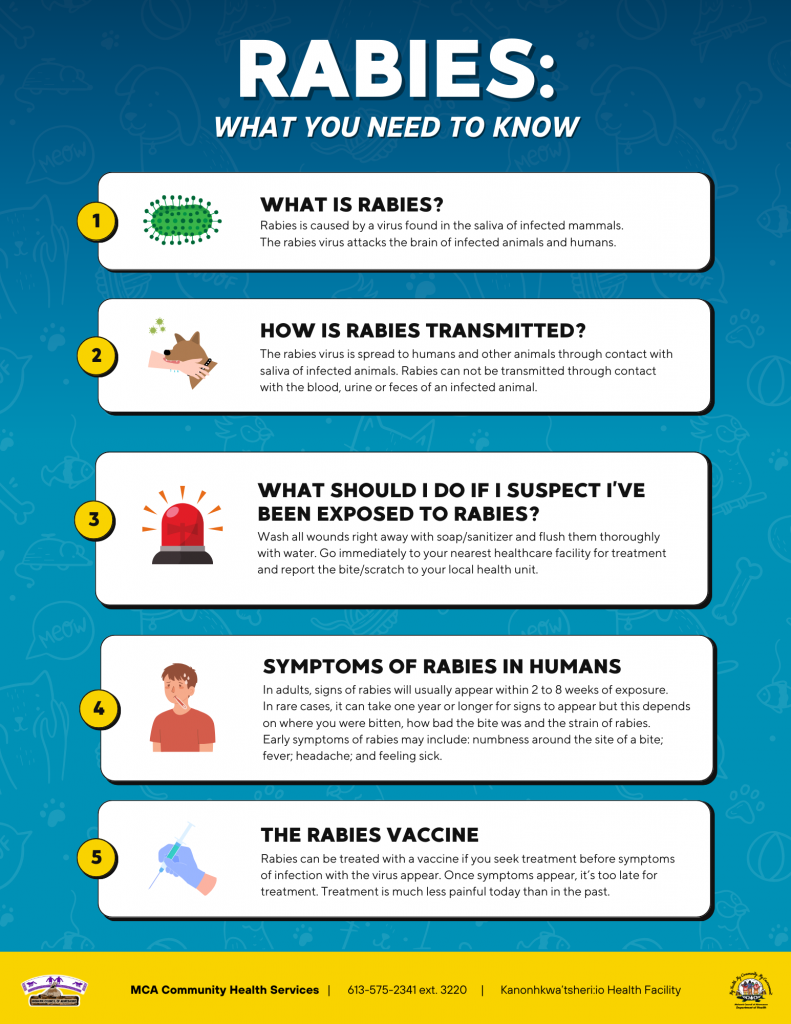DEPARTMENT OF HEALTH ADVISING COMMUNITY OF ONTARIO RABIES CASE
An individual in Ontario is currently hospitalized after contracting rabies from a bat in the province. Public health officials are urgently advising the public to be aware of the risk of rabies. If left untreated, rabies in humans is almost always fatal. If you’re exposed to rabies, you must seek treatment immediately.
WHAT IS RABIES?
Rabies is caused by a virus found in the saliva of infected mammals.
Rabies can infect any mammal, including humans, pets, wildlife and livestock. Birds, reptiles, amphibians and fish do not get rabies.
Rabies is spread through:
• bites that break the skin
• getting infected saliva in an open cut, sore or other wound
• getting infected saliva in the mouth, nose or eyes
• direct contact with infected brain or nervous system tissue through broken skin or mucous membranes in the eyes, nose, or mouth
Rabies can not be transmitted through contact with the blood, urine or feces of an infected animal.
In Ontario, the animals that spread rabies most often are bats, foxes, skunks and raccoons.
IF YOU’RE EXPOSED TO RABIES
If you’re exposed to the saliva of a potentially rabid animal:
• wash the bite or scratch with soap and warm water immediately (use hand sanitizer if there’s no soap or water nearby)
• call your family doctor or go to the nearest hospital for treatment right away
• report the bite or scratch to your local public health unit.
SYMPTOMS OF RABIES IN HUMANS
In adults, signs of rabies will usually appear within 2 to 8 weeks of exposure. In rare cases, it can take one year or longer for signs to appear but this depends on where you were bitten, how bad the bite was and the strain of rabies.
Early symptoms of rabies may include:
• numbness around the site of a bite
• fever
• headache
• feeling sick
Later symptoms of rabies may include:
• itchiness around the site of the bite (even after it’s healed)
• muscle spasms
• fear of air gusts (aerophobia)
• fear of water (hydrophobia)
• difficulty breathing
Once symptoms of rabies begin to appear, the disease is almost always fatal.
THE RABIES VACCINE
Rabies can be treated with a vaccine if you seek treatment before symptoms of infection with the virus appear. Once symptoms appear, it’s too late for treatment.
You will get five shots over 14 days and treatment is much less painful today than in the past.
WILDLIFE
Bats, skunks, foxes and raccoons are the most common carriers of the rabies virus in Canada.
In Ontario, bats pose the biggest threat of transmitting rabies to humans because unlike other animals, they can’t be vaccinated by dropping baits containing the vaccine in urban, forested rural or agricultural areas.
HOUSEHOLD PETS
Household pets can also carry the rabies virus. One infected cat or dog can expose many people to the virus.
In Ontario, you’re required, by law, to make sure your pets are up-to-date on their rabies vaccinations. Ensure your pets are up to date and contact your local veterinarian to arrange a rabies vaccine as soon as possible.
Wildlife Health Information Line
Call 1-888-574-6656 (monitored during business hours) for more information about:
• sick or strange-acting wildlife
• rabies in Ontario
• the rabies oral vaccine bait
• how to report a suspected rabid animal
• what we are doing to control terrestrial rabies

